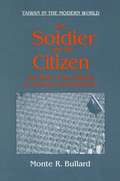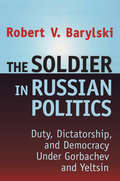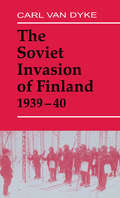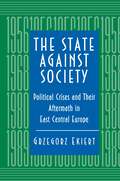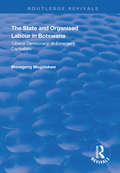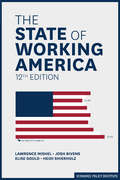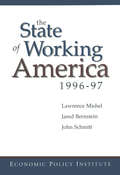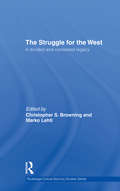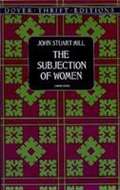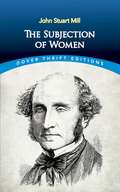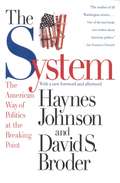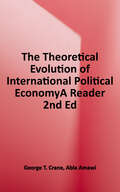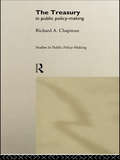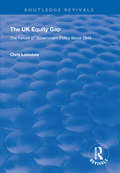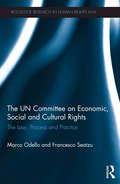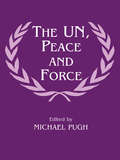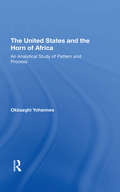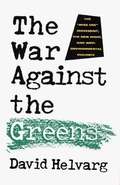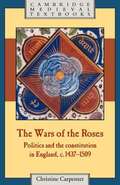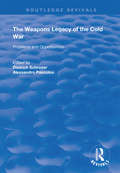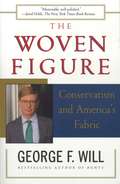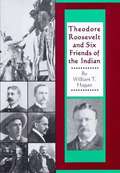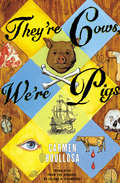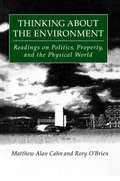- Table View
- List View
The Soldier and the Citizen: Role of the Military in Taiwan's Development (Taiwan In The Modern World Ser.)
by Monte R. BullardA soldier-citizen describes the role of the Republic of China's military in the political socialization of Taiwan's citizens during the first two decades after the loss of the Chinese mainland.
The Soldier in Russian Politics, 1985-96
by Robert BarylskiIf Russia is to become a viable democracy, it will need a viable state to make and enforce decisions that nurture societal cohesion and sustain complex economic activity. Armed forces are essential attributes of viable modern states, but what happens when states undergo major structural changes? What was the military's contribution to the end of the Soviet Union and the rise of post-Soviet Russia?The Soldier in Russian Politics is the first study to go beyond familiar accounts of the main events that brought down the Soviet state and began its reconstruction. It captures the interplay between soldier and civilian politicians in a major political history based on solid political-sociological analysis. Barylski uses the study of civil-military relations to explore new political and intellectual conditions and explain the historic relationship between changes in Western models of Russian reality and political change in the former Soviet Union.Examining the military's participation in every major, twentieth-century, political change from 1917 to 1991, Barylski demonstrates that every deep political transformation in Russia has military dimensions. Barylski discusses how the Russian presidency's power to command and control the military without legislative checks and balances led to armed conflict with Parliament in October 1993 and to the Chechen war of 1994-1996, and is unhealthy for long term democratic development. Barylski analyzes ministers of defense Yazov, Shaposhnikov, Grachev, and Rodionov as political actors, traces the careers of ambitious political soldiers such as Aleksandr Lebed and Aleksandr Rutskoi, and describes the military's growing political alienation from the Yeltsin administration. His final chapters cover the presidential elections, the short-lived Yeltsin-Lebed political alliance, the tensions associated with Yeltsin's ailments, and Yeltsin's efforts to rebuild his personal power political effectiveness.The Soldier in Russian Politics presents political history in an incisive and objective manner. It applauds the progressive officers, soldiers, and politicians where decisions minimized bloodshed and prevented civil war. But it also warns that civilian and military leaders can make mistakes which cause political institutional failure, violence, and dictatorship. This book will interest political scientists, political sociologists, students of Russian and soviet politics, and all military historians and professionals.
The Soviet Invasion of Finland, 1939-40 (Soviet (Russian) Military Experience #No. 3)
by Carl Van DykeWestern accounts of the Soviet-Finnish war have been reliant on Western sources. Using Russian archival and previously classified secondary sources to document the experience of the Red Army in conflict with Finland, Carl Van Dyke offers a reassessment of the conflict.
The State against Society: Political Crises and Their Aftermath in East Central Europe
by Grzegorz EkiertClassical images of state-socialism developed in contemporary social sciences were founded on simple presuppositions. State-socialist regimes were considered to be politically stable due to their pervasive institutional and ideological control over the everyday lives of their citizens, impervious to reform and change, and representative of extreme political and economic dependency. Despite their contrasting historical experiences, they have been treated as basically identical in their institutional design, social and economic structures, and policies. Grzegorz Ekiert challenges this notion in a comparative analysis of the major political crises in post-1945 East Central Europe: Hungary (1956-63), Czechoslovakia (1968-76), and Poland (1980-89). The author maintains that the nature and consequences of these crises can better explain the distinctive experiences of East Central European countries under communist rule than can the formal characteristics of their political and economic systems or their politically dependent status. He explores how political crises reshaped party-state institutions, redefined relations between party and state institutions, altered the relationship between the state and various groups and organizations within society, and modified the political practices of these regimes. He shows how these events transformed cultural categories, produced collective memories, and imposed long-lasting constraints on mass political behavior and the policy choices of ruling elites. These crises shaped the political evolution of the region, produced important cross-national differences among state-socialist regimes, and contributed to the distinctive patterns of their collapse.
The State and Organised Labour in Botswana: Liberal Democracy in Emergent Capitalism (Routledge Revivals)
by Monageng MogalakweFirst published in 1997, this volume departs from conventional analyses of Botswana’s political economy and focuses on the second phase of Botswana’s capitalist development from 1966-1990, arguing that even in a formally liberal democratic country, the imperatives of economic growth and development in a capitalist context give rise to the state’s close supervision and control of organised labour. Taking inspiration from Marx’s theories of history, Monageng Mogalakwe examines the capitalist form of the Botswana state and its relationships with the trade unions, labour law, industrial relations, class struggle and organised labour in a period characterised by direct state intervention in the economy and in industrial relations.
The State of Working America
by Josh Bivens Lawrence Mishel Elise Gould Heidi ShierholzPraise for previous editions of The State of Working America: "The State of Working America remains unrivaled as the most-trusted source for a comprehensive understanding of how working Americans and their families are faring in today's economy. "-Robert B. Reich "It is the inequality of wealth, argue the authors, rather than new technology (as some would have it), that is responsible for the failure of America's workplace to keep pace with the country's economic growth. The State of Working America is a well-written, soundly argued, and important reference book. "-Library Journal "If you want to know what happened to the economic well-being of the average American in the past decade or so, this is the book for you. It should be required reading for Americans of all political persuasions. "-Richard Freeman, Harvard University "A truly comprehensive and useful book that provides a reality check on loose statements about U. S. labor markets. It should be cheered by all Americans who earn their living from work. "-William Wolman, former chief economist, CNBC's Business Week "The State of Working America provides very valuable factual and analytic material on the economic conditions of American workers. It is the very best source of information on this important subject. "-Ray Marshall, University of Texas, former U. S. Secretary of Labor "An indispensable work . . . on family income, wages, taxes, employment, and the distribution of wealth. "-Simon Head, The New York Review of Books "No matter what political camp you're in, this is the single most valuable book I know of about the state of America, period. It is the most referenced, most influential resource book of its kind. "-Jeff Madrick, author of The End of Affluence "This book is the single best yardstick for measuring whether or not our economic policies are doing enough to ensure that our economy can, once again, grow for everybody. "-Richard A. Gephardt "The best place to review the latest developments in changes in the distribution of income and wealth. "-Lester Thurow The State of Working America, prepared biennially since 1988 by the Economic Policy Institute, includes a wide variety of data on family incomes, wages, taxes, unemployment, wealth, and poverty-data that enable the authors to closely examine the effect of the economy on the living standards of the American people. This edition, like the previous ones, exposes and analyzes the most recent and critical trends in the country.
The State of Working America: 1996-97 (State Of Working America Ser.)
by Jared Bernstein Lawrence Mishel John SchmittThe State of Working America, 1996-97 presents a statistical portrait of the standard of living of America's working families based on the most recent data available. By thoroughly analyzing areas such as family income, taxes, wages, jobs, wealth, and poverty, Mishel, Bernstein, and Schmitt show how the current economy is reflected in the lives of American workers. The new edition will update all statistical data and add a chapter on regional differences.
The Struggle for the West: A Divided and Contested Legacy (Routledge Critical Security Studies)
by Christopher Browning Marko LehtiIn recent years debates about the nature and future of the West have been high on the political agenda. Prognoses of the West's imminent demise have been countered by those arguing for its continued relevance, or those arguing that while the West will survive its nature, and the balance of power between its constituent units, is transforming. This book argues that understanding contemporary developments requires subjecting the very idea of the West to critical scrutiny and in particular asking what kind of concept it actually is. Locating the West as a discursive concept the book argues attempts to save, fix or reclaim the meaning of the West are illustrative of political agendas rather than indicative of accurate claims about the essential nature of the West. In contrast, the book argues that as a concept the West is impregnated with various discursive legacies, the most embedded of which are those of a civilisational, modern and political West. However, while attempts to define the West's essence are therefore doomed to fail, given the concept's historical and discursive flexibility, such attempts reaffirm the legitimising role which claims to the West continue to perform. Beyond this, the book challenges traditional genealogies of the West, which overwhelmingly depict the West as an inside-out concept. In contrast, the book argues that historically outsiders have played an important role in defining the nature of the West and constituting it as a political subject; processes that remain evident today. This book will particularly interest students of critical security studies, critical geopolitics, European politics, American politics and IR theory.
The Subjection of Women
by John Stuart MillThe philosopher argues for equality in legal, political, social and domestic relations between men and women. Carefully reasoned and clearly expressed with logic and consistency, the work remains a landmark in the important struggle for human rights.
The Subjection of Women (Dover Thrift Editions Ser.)
by John Stuart MillThe renowned and influential essay by the great English philosopher argues for equality in all legal, political, social and domestic relations between men and women. Carefully reasoned and clearly expressed with great logic and consistency, the work remains today a landmark in the important struggle for human rights.
The System: The American Way of Politics at the Breaking Point
by Haynes Johnson David S. BroderTaking as an example the Clinton health care reform initiative, the authors show how a policy that aimed to please everyone ended by satisfying no one due to pressure groups, political gamesmanship and the inertia of the American 'system'.
The Theoretical Evolution of International Political Economy: A Reader
by George T. Crane Abla AmawiThis collection of seminal readings in international political economy charts the historical and theoretical evolution of the field from the eighteenth century to the present day. Bringing together classic works and leading contemporary arguments, this book outlines the development of three schools of IPE thought—Liberalism, Marxism, and Realism—and also includes recent syntheses of these approaches to show how conventional theoretical categories are giving way to more eclectic conceptual schemes. <p><p>The second edition features an added section on the postmodern turn in the study of international political economy, and includes a number of new readings. The readings include works by Alexander Hamilton, Friedrich List, David Ricardo, Adam Smith, Lenin, Karl Marx, Friedrich Engels, Richard Cooper, Robert O. Keohane, Joseph S. Nye, Christopher Chase-Dunn, Robert Cox, Robert Gilpin, Mancur Olson, Richard Zeckhauser, Bruno S. Frey, Immanuel Wallerstein, Susan Strange, Donald J. Puchala, Raymond F. Hopkins, Alice A. Amsden, Peter M. Haas, David Harvey, and Michael J. Shapiro. <p><p>Providing many of the most frequently cited IPE references in a single volume, the second edition of The Theoretical Evolution of International Political Economy will no doubt be a valuable resource for students of international relations and international economics.
The Treasury in Public Policy-Making (Studies In Public Policy Making Ser.)
by Prof Richard ChapmanAnalyses the Treasury's role in public policy making and makes an original contribution to knowledge about the current work of the Treasury.The book focuses on three main areas:* the development of the Treasury from earliest times to the present* the current structure and organization of the Treasury following the radical changes which took place i
The UK Equity Gap: The Failure of Government Policy Since 1945 (Routledge Revivals)
by Chris LonsdaleFirst published in 1997, this volume investigates the important economic issue of small business finance. The inability of small firms to acquire equity finance is believed to be an important factor in the UK’s continued relative economic decline. Throughout the post-war period both Labour and Conservative Governments have recognised this and devised micro-economic policies to address the issue. In this book the author assesses the effectiveness of these policies, particularly focusing upon the past 20 years when policy has been accompanied by the development of the UK venture capital industry. The author concludes that government policy has been largely unsuccessful in bridging the equity gap, but that the problem could be addressed effectively if only lessons were learned from the past. This book provides those lessons, and is particularly timely given that the new Labour Government is currently reviewing policy in this area.
The UN Committee on Economic, Social and Cultural Rights: The Law, Process and Practice (Routledge Research In Human Rights Law Ser.)
by Marco Odello Francesco SeatzuThe book concerns the study and analysis of the UN Committee on Economic, Social and Cultural Rights from an international legal perspective, taking into consideration the adoption of the 2008 Optional Protocol to the International Covenant on Economic, Social and Cultural Rights (ICESCR).The volume provides a detailed account of the structure and functioning of the Committee on Economic, Social and Cultural Rights in the light of its jurisprudence, through a study of the Committee’s procedures and practices (periodic reports and general comments), including taking into account the Optional Protocol for individual complaint procedure. The book considers the possible implications of the work of this Committee on other UN Committees, such as the Human Rights Committee and the UN Committee on the Rights of the Child, as well as considering the repercussions of its work on the international protection of fundamental rights, such as the right to education, to health and adequate food.The UN Committee on Economic, Social and Cultural Rights will be of particular interest to academics and students of International and Human Rights law.
The UN, Peace and Force
by Michael PughRestoring and maintaining peace within war-torn societies is a relatively new task for the United Nations. This book examines the options for the UN in the use of force to secure peace, and the extent to which peacekeeping can be effectively extended to coerce warring factions. A combination of internationally distinguished academics and new scholars at the forefront of research are represented, making an important contribution to the debate about the role of international military operations in the maintenance of international peace and security.
The United States And The Horn Of Africa: An Analytical Study Of Pattern And Process
by Okbazghi YohannesThe recent collapse of the bipolar world order has been accompanied by momentous changes, dynamically setting the international system in motion toward an uncertain future. Such a profound transformation of the international system mandates an evaluation of American foreign policy and the role of the United States in this radically changed world order. In this insightful new book, Okbazghi Yohannes examines the role of U.S. foreign policy with regard to the four countries that make up the Horn of Africa: Eritrea, Sudan, Somalia, and Ethiopia. The book begins by analyzing the historical patterns and processes of American policy in relation to the African Horn during and after the Cold War, offering a comprehensive description of the fundamental policy choices of the United States and the means chosen to achieve American objectives in the region. Finally, Yohannes considers the extent to which the American role in the African Horn aided or impeded the emergence of political democracy and the promotion of economic development within the region. By juxtaposing this new method of examination with traditional approaches, the book reveals a greater coherence in the structural relationship between U.S. policy and the politics of the African Horn. Skillfully incorporating informative background material regarding the history, politics, and diplomacy of the countries covered by the study, Yohannes addresses the interests of both the specialist and the general reader.
The War Against the Greens: The "Wise-Use" Movement, the New Right, and Anti-Environmental Violence
by David HelvargA shadowy backlash against environmentalists has begun to emerge in America, the most visible element of which calls itself the "Wise Use" movement. Among its stated goals are the unregulated use of timber, oil, gas, minerals, and range land, and the abolition of all environmental laws and agencies.
The Wars of the Roses: Politics and the Constitution in England, 1437-1509 (Cambridge Medieval Textbooks)
by Christine CarpenterThe Wars of the Roses was a period of major crisis in English politics and in the lives of the English landowning classes. This book attempts to explain why the Wars occurred, and with what results, by placing them in the context of the ruling classes' expectations of kingship and governance at that time. The book draws on a large amount of detailed work written over the past twenty-five years on local and national politics, to present a coherent synthesis of what can seem a baffling and incoherent period. This is a new interpretation of English politics during the extended period of political crisis beginning with the majority of Henry VI in c. 1437 and lasting at least up to the accession of Henry VIII in 1509.
The Weapons Legacy of the Cold War: Problems and Opportunities (Routledge Revivals)
by Alessandro Pascolini Dietrich SchroeerFirst published in 1997, this volume builds its discussion on a technological base along with policy implications, and constitutes a review of the current situation in international security created by the Cold War, and how the end of the Cold War is likely to change the situation. As the close of the Cold War created a multitude of changes in international security, resulting in a broad range of topics tackled in this collection. It features specialists in military technology, physics, political science, public and international affairs.
The Woven Figure
by George F. WillSwatches From The Century's End ...I cannot deny my past to which my self is wed, the woven figure cannot undo its thread. Louis MacNeice, "Valediction" These words express a truth of conservatism that has discomfited conservatives in the years covered by this volume. This collection of columns shows how, in the mid-1990s, conservatives fancied themselves poised to conduct a revolution, a radical reorientation of politics and governance. But in the late 1990s, they have discovered how resistant a complex nation is to being undone and rewoven. In this volume, George F. Will, distinguished political columnist and cultural critic, examines many episodes of the conservative tribulations and the liberal accommodations to the new political landscape. These writings present a map of the landscape, a guide for people perplexed by the gap between contemporary political theories and practices. With his customary linguistic flair and acerbic wit, Mr. Will tackles a wide range of subjects, including political correctness on college campuses; extreme fighting; the 1996 presidential campaign; judicial activism; ESPN; and Corvettes. These writings are history written on deadline, and together they constitute a richly woven tapestry of our era.
The principles of representative government
by Bernard ManinThe thesis of this original and provocative book is that representative government should be understood as a combination of democratic and undemocratic elements. Challenging the conventionally held views on the subject, Professor Manin reminds us that while today representative institutions and democracy appear as virtually indistinguishable, when representative government was first established in Europe and America, it was designed in opposition to democracy proper. The author identifies the essential features of democratic institutions and reviews the history of their application.
Theodore Roosevelt and Six Friends of the Indian
by William T. HaganThis is an account of the efforts of six individuals and two organizations to capitalize on their acquaintance with President Theodore Roosevelt.
They're Cows, We're Pigs (Books That Changed the World)
by Carmen BoullosaA dark, thought-provoking adventure that “artfully evokes the blood-soaked reality of 17th-century pirates” (Entertainment Weekly).This “wryly humorous, satiric, and often macabre novel” (Library Journal) follows Jean Smeeks, a Flemish thirteen-year-old who signs up as an indentured servant with the French West Indies Company, but instead winds up a slave on the notorious island of Tortuga. Over time, he learns the arts of herbal medicine and surgery—a skill that allows him to join a band of Caribbean pirates. Contrasting Jean’s romantic pull toward the “Brethren of the Coast”—an all-male society pursuing socialist, anti-colonialist ideals—with the brutal reality of their lawless existence, They’re Cows, We’re Pigs is a “unique and memorable” novel whose “pirate world leaves you as a good book should: thinking” (The Boston Herald).
Thinking About the Environment: Readings on Politics, Property and the Physical World
by Matthew Alan Cahn Rory O'BrienUnderlying current controversies about environmental regulation are shared concerns, divided interests and different ways of thinking about the earth and our proper relationship to it. This book brings together writings on nature and environment that illuminate thought and action in this realm.
